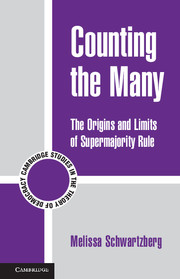Book contents
- Frontmatter
- Dedication
- Contents
- Acknowledgments
- 1 Introduction
- Part I A Remedy for the Problems of Unanimity
- Part II A Remedy for the Problems of Majority Rule
- 5 Equality, Majority Rule, and Supermajorities
- 6 Constitutionalism without Supermajorities
- 7 Constitutionalism under Complex Majoritarianism
- 8 Conclusion
- References
- Index
8 - Conclusion
Published online by Cambridge University Press: 05 June 2014
- Frontmatter
- Dedication
- Contents
- Acknowledgments
- 1 Introduction
- Part I A Remedy for the Problems of Unanimity
- Part II A Remedy for the Problems of Majority Rule
- 5 Equality, Majority Rule, and Supermajorities
- 6 Constitutionalism without Supermajorities
- 7 Constitutionalism under Complex Majoritarianism
- 8 Conclusion
- References
- Index
Summary
The aim of this work has been to challenge the contemporary assumption that supermajority rules are not only normatively unproblematic, but necessary to achieve the desiderata of institutional stability, consensus, and minority protections. Although supermajority rules in the modern era ostensibly aim to reduce the risks associated with political instability, they do so at the cost of introducing new liabilities associated with the biased judgments they generate and secure. Because institutions secure the outcomes of morally arbitrary bargains under the conditions of distributive inequality, to bias future change in favor of these outcomes carries substantial normative risks. Supermajority rule may be defensible in those cases where a bias might be reasonably considered necessary to avoid seriously adverse consequences, but ascertaining the conditions in which this would hold is more difficult than is typically assumed. It is surely not the case that the interests of every minority group, for instance, merit such a bias, and supermajority rules cannot provide a means test.
As the first half of this book suggested, however, supermajority rules do constitute an attractive alternative to unanimity in those rare circumstances when we could expect perfect agreement: for instance, the selection of the true pope by the cardinals or the identification of the general will by citizens of a well-ordered society. When unanimity is not achieved in such contexts, this was thought to constitute evidence of malice, of self-interested behavior, of ignorance, or simply bad judgment on the part of the minority. Historically, the move from unanimity to supermajority rule was justified in order to ensure that erroneous members of the minority could not veto the probably correct outcome, assuming the community were not pathological. As we have also seen, a supermajority rule also reduces the probability of a different sort of human weakness generated by unanimity, namely a tendency toward coercive behavior against lone holdouts. Because contemporary political life is rife with disagreement rather than concord, we might think that these arguments offer purely antiquarian interest. This is partially true: such justifications do not provide valid reasons for adopting supermajority rule as an alternative to majority rule. Yet in certain important circumstances – federations or multinational associations such as the European Union, for instance – unanimity often is still required. However, because unanimity rules so readily lead to breakdown, qualified majority rules are frequently proposed as an alternative, and may be defended on these grounds.
- Type
- Chapter
- Information
- Counting the ManyThe Origins and Limits of Supermajority Rule, pp. 205 - 216Publisher: Cambridge University PressPrint publication year: 2013

